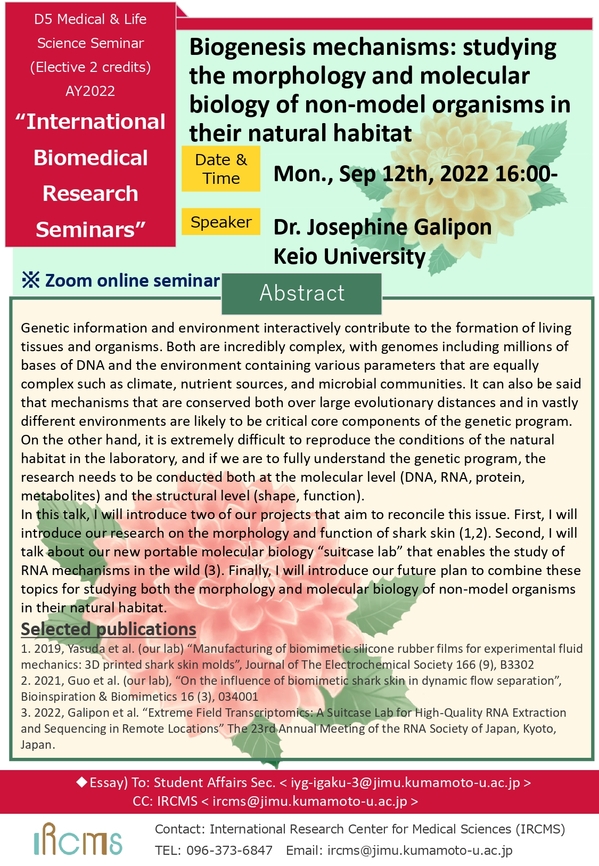- HOME
- News & Events
- [Sep. 12] D5 Medical & Life Science Seminar - Dr. Josephine Galipon (Keio University)
News & Events
[Sep. 12] D5 Medical & Life Science Seminar - Dr. Josephine Galipon (Keio University)
September 6 2022
The "D5 Medical & Life Science Seminar" course will be offered by International Research Center for Medical Sciences (IRCMS). It will run from May 2022 to March 2023, with lectures given by scientists who are affiliated with IRCMS or in collaboration with researchers at IRCMS. The lectures will be given once a month, in English, and by leading scientists in the relevant research field. Students will be taught: 1) how normal physiological functions are maintained in the human body; 2) how these systems become abnormal under certain pathophysiologic conditions; 3) why stem cells are important in animal development and homeostasis; 4) how stem cell-based approaches can help us understand disease mechanisms and find potential cure for diseases related to stem cell malfunction (e.g., cancer, aging).
Anyone who wants to join is welcome.
For students who have registered for the course, please check your attendance in Moodle.
Date : September 12, 2022 (Monday)
Time : 16:00 -
* Zoom online seminar
Speaker : Dr. Josephine Galipon
Keio University
Title : Biogenesis mechanisms: studying the morphology and molecular biology of non-model organisms in their natural habitat
Abstract :
Genetic information and environment interactively contribute to the formation of living tissues and organisms. Both are incredibly complex, with genomes including millions of bases of DNA and the environment containing various parameters that are equally complex such as climate, nutrient sources, and microbial communities. It can also be said that mechanisms that are conserved both over large evolutionary distances and in vastly different environments are likely to be critical core components of the genetic program. On the other hand, it is extremely difficult to reproduce the conditions of the natural habitat in the laboratory, and if we are to fully understand the genetic program, the research needs to be conducted both at the molecular level (DNA, RNA, protein, metabolites) and the structural level (shape, function).
In this talk, I will introduce two of our projects that aim to reconcile this issue. First, I will introduce our research on the morphology and function of shark skin (1,2). Second, I will talk about our new portable molecular biology "suitcase lab" that enables the study of RNA mechanisms in the wild (3). Finally, I will introduce our future plan to combine these topics for studying both the morphology and molecular biology of non-model organisms in their natural habitat.
<Selected publications>
1. 2019, Yasuda et al. (our lab) "Manufacturing of biomimetic silicone rubber films for experimental fluid mechanics: 3D printed shark skin molds", Journal of The Electrochemical Society 166 (9), B3302
2. 2021, Guo et al. (our lab), "On the influence of biomimetic shark skin in dynamic flow separation", Bioinspiration & Biomimetics 16 (3), 034001
3. 2022, Galipon et al. "Extreme Field Transcriptomics: A Suitcase Lab for High-Quality RNA Extraction and Sequencing in Remote Locations" The 23rd Annual Meeting of the RNA Society of Japan, Kyoto, Japan.
Flyer: (Click to enlarge)

